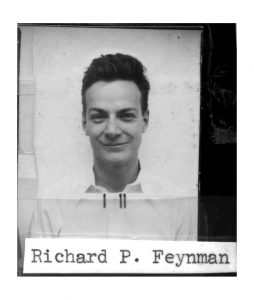
We have already devoted some posts in this blog to the role of beauty in mathematics, and also in physics (for example, this one and this one). Today I bring up the phrase that one of the most eminent physicists of the twentieth century dedicated to such an exciting subject. I am referring to Richard Feynman. In 1964 Feynman gave a series of lectures at Cornell University, which were recorded and broadcast by the BBC, and later compiled in the form of a book: The Character Of Physical Law (MIT Press). Almost as much has been written about Feynman’s personality as about his discoveries, which won him the Nobel Prize in 1965; as a sample, here is part of the introduction to the book signed by the Cornell dean: “In the preface there is a picture of Feynman happily playing the bongo. My friends at Caltech tell me that he sometimes visits nightclubs in Los Angeles to take over the drummer’s job; but Professor Feynman tells me he does not. Another of his specialities is safecracking. Legend tells that he once opened a locked safe, in a hidden section of the safe he removed a secret document and left a note saying “Guess who?”. I could tell you about the times when he learned Spanish before he went to give a series of lectures in Brazil, but I won’t”.
The small pill that interests me is in the second lecture, entitled The Relationship of Mathematics to Physics, in which Feynman masterfully explains the differences between the two disciplines and why mathematics is important for physics. On the subject of the beauty of nature, at the beginning of the lecture Feynman warns: “The purpose of this lecture is simply to emphasise that it is impossible to communicate honestly the beauty of the laws of nature, so that people can really feel it, if people do not have a thorough knowledge of mathematics. I’m sorry, but it seems to be so”.
And at the end of the lecture, he concludes:
For those who do not have a knowledge of mathematics, it is difficult to grasp the real sense of beauty, of profound beauty, of nature.
And he added: “I think this certainly separates people who have lived and people who have not lived the experience of understanding mathematics well enough to understand nature at least once. If you want to know nature, if you want to grasp nature, you need to know the language in which it speaks to you”.
Why this is so is what Feynman explains in his lecture.
Needless to say, like many of Feynman’s other books, The Character of Physical Law is highly recommended.
References
Richard Feynman, The Character of Physical Law, Tusquets, MIT Press, 2017.

Leave a Reply